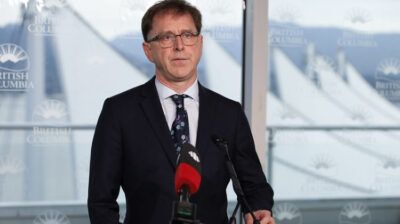(With files by Brendan Pawliw-MyPGNow)
“It’s been a very challenging time in health care,”
That’s from BC Health Minister Adrian Dix who says the province continues to work hard to beef up the number of nurses working in the province.
In September, the government announced 88 new residency seats at UBC’s faculty of medicine in post-secondary schools across the province – this included an increase of eight spots to the Northern Medical program upping the total to 40.
In an interview with Vista Radio, Dix stated more work is being done behind the scenes to fast-track those working in our hospitals.
“We took more steps in February and we are going to continue to take more steps to provide more support for them. We are at the bargaining table with nurses – we have 604 nursing positions all over British Columbia. We’ve added nurses and training positions in places like Fort St. John and we have to continue to do that work.”
Dix also noted that when he became Health Minster five years ago, BC was last in Canada in registered nurses per capita, and the number of registered actually declined while the Liberals were in power – throwing former health minister and current BC Liberal party leader Kevin Falcon under the bus.
“And so, that is the situation we picked up, and since then we have led Canada in new registered nurses per capita – we’ve led the country and we have added 18% to our bargaining unit association. We all know that we need nurses more and we have to continue to do that.”
In April, the province offered 9 million dollars in bursaries to help with assessment fees, which is expected to benefit 1,500 Internationally Educated Nurses entering our health system.
As well, the number of residency positions for international medical graduates has also increased – which will mean more physicians will be able to practice in the north via Return of Service Agreements once they are licensed. The IMG-BC program has grown from six entry positions in 2003 to 58 currently.
Dix remains bullish that Ottawa and the rest of the provinces and territories can come together and hammer out an improved healthcare agreement.
Right now, the federal share of health care expenses is at 22 percent – but the calls continue to grow for that to be increased to 35%.
Dix said while he was disappointed a new deal wasn’t reached during a two-day meeting in Vancouver earlier this month, he would like Justin Trudeau to step up and speak on this issue.
“I haven’t given up hope. I think the Prime Minister should come to the First Ministers Conference with the Premiers and discuss the future of health care in Canada and the future of the Canada Health Transfer – every dime will go to the health care people need.”
He also mentioned Ottawa needs to do a better job of pulling its weight on the issue, otherwise, public health care in our province will continue to suffer.
“The federal government has reduced its contribution to health care over time, it was supposed to be a 50-50 partnership. Last year, they paid about 22% of that partnership and as it declines at the federal level, support for public health is reduced by the prime minister.”
Dix added any further money invested by Ottawa would support the hiring and retaining of doctors, nurses, health sciences as well as primary and long-term care professionals.
Furthermore, the tentative Physicians Masters Agreement and new payment model will go a long way in recruiting and retaining family doctors in the north.
Starting in February, the average family doctor will be paid 385 thousand dollars a year up from 250 thousand.
In addition, the fee-for-service model is gone and is being replaced with different factors such as the time a doctor spends with a patient, the number of patients a doctor sees in a day, and the complexity of the issues a patient is facing.
Dix believes it will be a massive step forward in all corners of the province.
“I think we came up with something that has been broadly approved across BC and will help us in Prince George and in Smithers as much as it will in places like Coquitlam or Esquimalt.”
“The new doctor’s agreements cost us $704 million dollars. We didn’t wait for the federal government to say we are sending more money to do that. We took that action now and it’s a long-term adjustment. When you add hundreds of new nursing spaces it’s a long-term decision, those are permanent new spaces into the future. When you respond to the situation in long-term care, we had the worst rating in Canada when I became a minister and now we have met our targets in long-term care hiring – including the target of 7,000 people hired that we promised to support with things like infection control.”
According to the Ministry of Health, just under 72 hundred family doctors were practicing in BC, however, about 41 hundred of them are practicing in full-service primary care.
Something going on in the Cariboo you think people should know about?
Send us a news tip by emailing [email protected].








